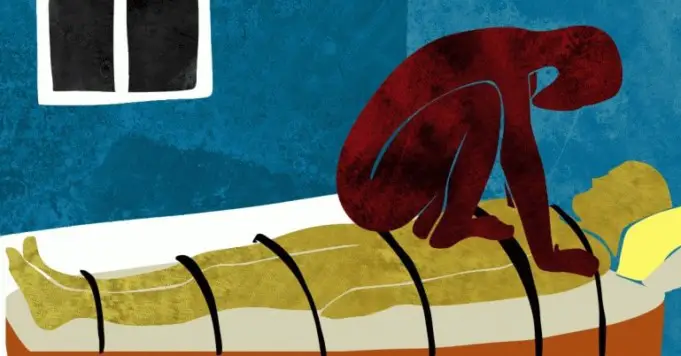Sleep paralysis is a common phenomenon that has been experienced by most people; it is a feeling of inability to move the body either at the onset of sleep or upon awakening.
During this experience, the individuals are conscious but they may feel as if they are being pressed or choked; it is often accompanied by intense fear and hallucinations.
It is not a serious medical condition; it starts during adolescence and can become frequent during ones 20s and 30s and it does not pose any serious health risk. Episodes last from a few seconds to a few minutes.
For centuries, humans have experienced this condition for centuries; the experiences differ among individuals but they can fall into one of the three categories below.
- Intruder: Some people hear sounds of doorknobs opening, footsteps, or a shadow being or sensing a threatening presence in the room.
- Vestibular-motor: In this category, people have a sense of spinning, falling, floating, flying or hovering over them or sometimes they feel it themselves. Some experience a type of out-of-body experience.
- Incubus: People in this category experience pressure on the chest, feelings of being pressed and choked, difficulty breathing with sense of being smothered, strangled or sexually assaulted by a malevolent beings. During the experience, the individuals believe that they are about to die.
Causes of Sleep Paralysis
Sleep paralysis occurs when parts of the rapid eye movement (REM) sleep occurs while awake; REM is the stage of sleep when the body is very active and dreams often occur; it is not clear why REM sleep occurs while awake but it has been associated with some risk factors. Factors linked to sleep paralysis are:
- A family history of sleep paralysis
- Narcolepsy and other sleep disorders
- Sleeping on the back
- Irregular sleep patterns and insufficient sleep
- Depression
- Anxiety disorders
- Obstructive sleep apnea
- Hypertension
Signs and symptoms of sleep paralysis
- Headaches, muscle spasms and paranoia
- Feeling as if death is approaching
- Inability to move the body when falling asleep or when waking (this can last for seconds to several minutes)
- Being consciously awake
- Inability to speak during the episode
- Sweating
- Feeling pressured on the chest
- Hallucinations and fearful sensations
When to seek medical help
This condition does not pose any serious health risk but it is advisable to see the doctor or sleep specialist when:
- It happens regularly
- There is fear or anxiety about going to sleep
- Difficulty falling asleep
- The individual falls asleep suddenly
- The individual feels unusually sleepy during the day
The doctor can help to diagnose and address any medical condition that is behind this, like depression, anxiety, sleep disorders or stress; suddenly falling asleep during the day can be a sign of narcolepsy, a rare brain disorder that is characterized by inability to stay awake or lose control of the muscle at unexpected or inappropriate times.
Things to do for better sleep
There are no treatments for this condition but there are things that can be done to reduce the risk factors that cause it, reduce the frequency or even prevent it from happening and they include:
- Have consistent bedtime and wake-up time.
- Have at least 8 hours of night sleep as an adult daily
- Ensure a comfortable sleep environment; sleep in a dark and well-ventilated, cool bedroom.
- Get good amount of sunlight during the day
- Don’t work or study in the bedroom
- Avoid napping after 3pm and it should not be too long; less than 90 minutes is OK.
- Avoid eating heavy foods close to your bedtime; do not take anything two hours to bedtime.
- Don’t sleep with the light or TV on.
- Abstain from alcohol and caffeine
- Exercise daily bit not too close to bedtime
- You can listen to relaxing music before you sleep
- Do not use your phone or gadgets when it’s time to sleep
- Don’t use electronics for one hour before going to bed
- Manage stress effectively; don’t let it overwhelm you
- Reduce intake of stimulants
- Treat depression or anxiety disorder if you have
- Regular prayers and meditations can help
- Avoid sleeping on your back












